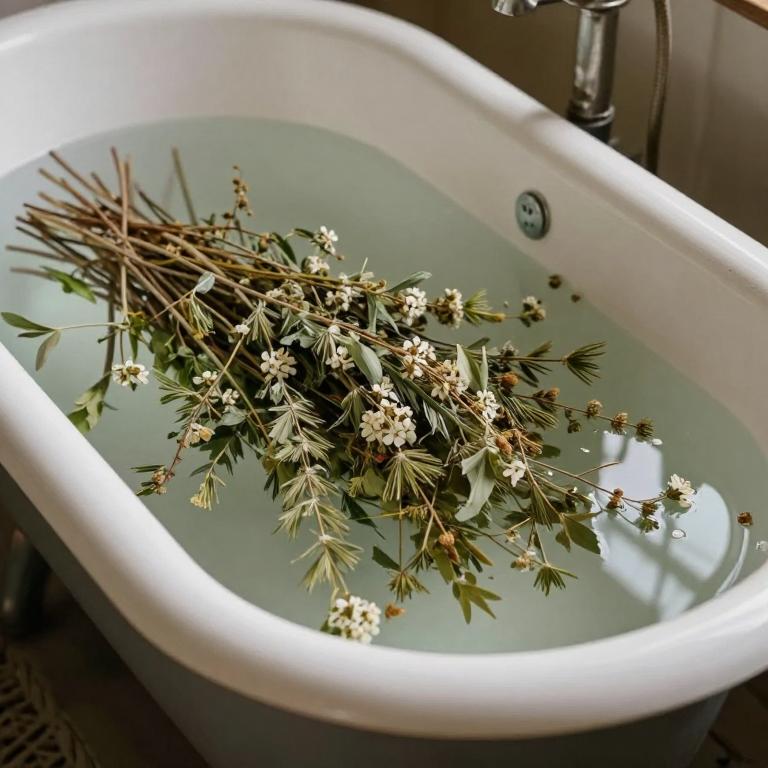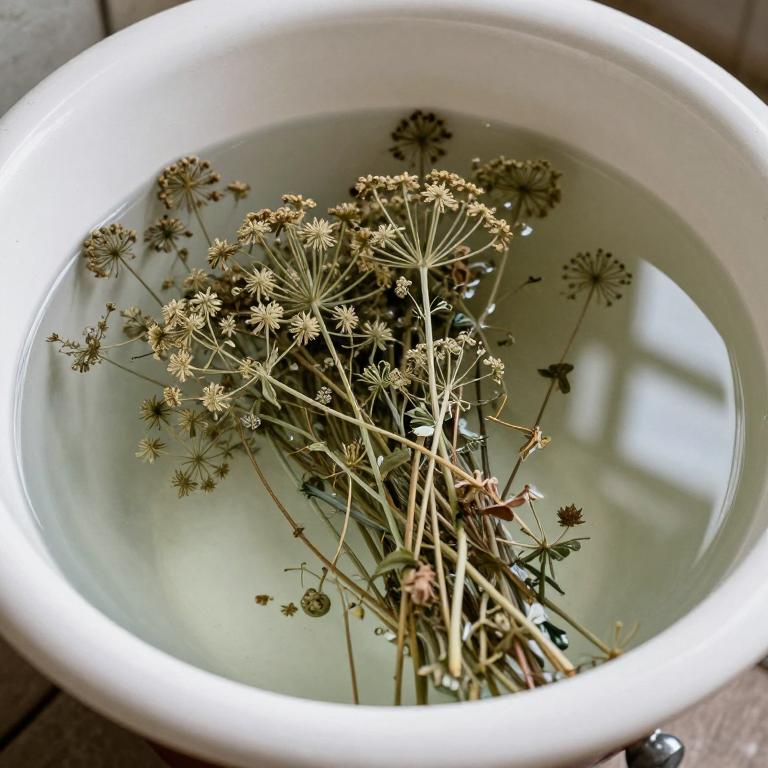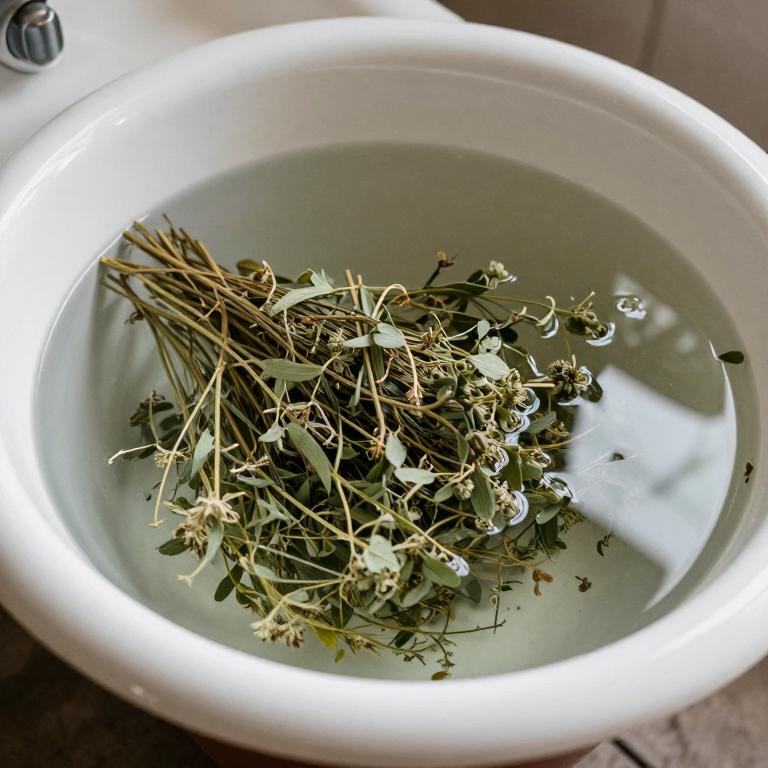10 Best Herbal Baths For Migraine

Herbal baths have gained popularity as a natural remedy for migraine relief, offering a soothing and holistic approach to managing symptoms.
Certain herbs such as lavender, peppermint, and eucalyptus are known for their calming and analgesic properties, which can help reduce headache intensity and promote relaxation. Soaking in a warm bath infused with these herbs may help ease muscle tension and improve blood circulation, both of which are commonly associated with migraine attacks. Additionally, the aromatic compounds in these herbs can stimulate the release of endorphins, which may help alleviate pain and reduce stress levels.
While herbal baths are not a cure for migraines, they can serve as a complementary therapy to support overall well-being and potentially reduce the frequency or severity of migraine episodes.
Table of Contents
- 1. Rosemary (Rosmarinus officinalis)
- 2. Valerian (Valeriana officinalis)
- 3. Yarrow (Achillea millefolium)
- 4. English lavender (Lavandula angustifolia)
- 5. Stinging nettle (Urtica dioica)
- 6. Salvia (Salvia officinalis)
- 7. St. john's wort (Hypericum perforatum)
- 8. Anise (Pimpinella anisum)
- 9. Lemon balm (Melissa officinalis)
- 10. Peppermint (Mentha piperita)
1. Rosemary (Rosmarinus officinalis)

Rosmarinus officinalis, commonly known as rosemary, has been traditionally used in herbal baths to alleviate symptoms of migraine due to its calming and anti-inflammatory properties.
The essential oils derived from rosemary leaves contain compounds like 1,8-cineole and camphor, which are believed to help reduce tension and ease headache pain. When used in a warm bath, rosemary can promote relaxation and improve blood circulation, potentially reducing the intensity and frequency of migraines. Many individuals find that the aromatic diffusion of rosemary during a bath provides a soothing sensory experience that complements conventional migraine treatments.
However, it is important to consult with a healthcare professional before incorporating rosemary baths into a migraine management routine, especially for those with sensitive skin or existing health conditions.
2. Valerian (Valeriana officinalis)

Valeriana officinalis, commonly known as valerian, has been traditionally used for its calming properties and is sometimes incorporated into herbal baths to alleviate symptoms of migraine.
The essential oils and extracts from valerian root are believed to have sedative and muscle-relaxing effects, which may help reduce the tension and stress often associated with migraine headaches. When added to a warm bath, valerian can promote relaxation and improve blood circulation, potentially easing the severity of migraine attacks. However, it is important to consult with a healthcare professional before using valerian, as it may interact with certain medications or cause side effects in some individuals.
While herbal baths can be a complementary approach to managing migraines, they should not replace conventional medical treatments without proper guidance.
3. Yarrow (Achillea millefolium)

Achillea millefolium, commonly known as yarrow, has been traditionally used in herbal baths to alleviate symptoms of migraine.
The infusion of dried yarrow flowers into warm water is believed to promote relaxation and ease tension in the muscles, which can contribute to migraine relief. Its anti-inflammatory and analgesic properties may help reduce the intensity and frequency of migraine attacks. Herbal baths with yarrow are often recommended as a complementary therapy alongside conventional treatments for migraine.
However, it is important to consult with a healthcare professional before using yarrow baths, especially for individuals with known allergies or medical conditions.
4. English lavender (Lavandula angustifolia)

Lavandula angustifolia, commonly known as English lavender, has been traditionally used in herbal baths to alleviate symptoms of migraine.
The calming and soothing properties of lavender essential oil are believed to reduce stress and tension, which are common triggers for migraines. When added to warm bath water, the aromatic compounds of lavender can promote relaxation and ease muscle tension throughout the body. Studies suggest that the inhalation of lavender essential oil may have a positive impact on pain perception and mood, potentially offering relief from migraine headaches.
Incorporating lavender into a regular bath routine may serve as a natural, complementary therapy for managing migraine symptoms.
5. Stinging nettle (Urtica dioica)

Urtica dioica, commonly known as stinging nettle, has been traditionally used in herbal baths to alleviate symptoms of migraine.
The plant contains compounds such as histamine and acetylcholine, which may help reduce inflammation and ease muscle tension, both of which are often associated with migraine attacks. When used in a warm herbal bath, stinging nettle can promote relaxation and improve blood circulation, potentially reducing the frequency and intensity of migraines. Some studies suggest that the anti-inflammatory and analgesic properties of nettle may contribute to its effectiveness in managing headache symptoms.
However, it is important to consult with a healthcare provider before incorporating stinging nettle baths into a migraine treatment regimen, especially for individuals with sensitive skin or allergies.
6. Salvia (Salvia officinalis)

Salvia officinalis, commonly known as sage, has been traditionally used in herbal baths to support relief from migraine symptoms.
The essential oils and phytochemicals in sage, such as thujone and flavonoids, are believed to possess anti-inflammatory and analgesic properties that may help reduce headache intensity. Incorporating sage into a warm bath can promote relaxation and ease muscle tension, which are common triggers for migraines. Some studies suggest that the aromatic compounds in sage may influence the central nervous system, potentially offering a calming effect.
While more research is needed, many individuals find sage-infused baths to be a soothing complementary therapy for managing migraine episodes.
7. St. john's wort (Hypericum perforatum)

Hypericum perforatum, commonly known as St. John's wort, has been traditionally used in herbal baths to alleviate symptoms of migraines.
When infused into bath water, the active compounds in hypericum, such as hypericin and hyperforin, may help reduce inflammation and soothe nerve pain associated with migraines. The calming effects of the herb, combined with the relaxing properties of warm water, can promote relaxation and ease tension that often precedes a migraine episode. Herbal baths with St. John's wort are generally considered safe for most people, though they should be used with caution, especially if one is on medications that interact with serotonin.
It is recommended to consult with a healthcare professional before incorporating hypericum perforatum baths into a migraine management routine.
8. Anise (Pimpinella anisum)

Pimpinella anisum, commonly known as anise, has been traditionally used in herbal baths for its calming and soothing properties, which may help alleviate symptoms of migraine.
The essential oils derived from anise seeds are believed to have antispasmodic and analgesic effects, potentially reducing the intensity of migraine pain when used in bathwater. Infusing anise in warm water and soaking the body can promote relaxation and ease tension, which are common triggers for migraines. This natural remedy is often recommended as a complementary therapy to conventional treatments, offering a gentler approach to managing migraine discomfort.
However, it is important to consult with a healthcare professional before using anise baths, especially for individuals with allergies or sensitive skin.
9. Lemon balm (Melissa officinalis)

Melissa officinalis, commonly known as lemon balm, has been traditionally used in herbal baths to support the relief of migraine symptoms.
When infused into bath water, lemon balm's calming properties can help reduce stress and tension, which are common triggers for migraines. The soothing scent of lemon balm may also promote relaxation and improve mood, contributing to an overall sense of well-being. These baths can be particularly beneficial for individuals seeking natural, non-pharmacological approaches to managing their migraines.
While more research is needed, anecdotal evidence suggests that regular use of lemon balm herbal baths may offer a gentle and holistic way to alleviate migraine-related discomfort.
10. Peppermint (Mentha piperita)

Mentha piperita, commonly known as peppermint, has been traditionally used in herbal baths to alleviate symptoms of migraine.
The invigorating aroma and cooling properties of peppermint can help reduce tension and soothe the nervous system, potentially easing migraine pain. When added to a warm bath, the essential oils from fresh or dried peppermint leaves can be absorbed through the skin, promoting relaxation and improving blood circulation. Some studies suggest that the menthol in peppermint may have a mild analgesic effect, helping to relieve headache intensity.
However, it is important to use peppermint cautiously, as some individuals may experience skin irritation or allergic reactions, and it should not replace professional medical treatment for migraines.